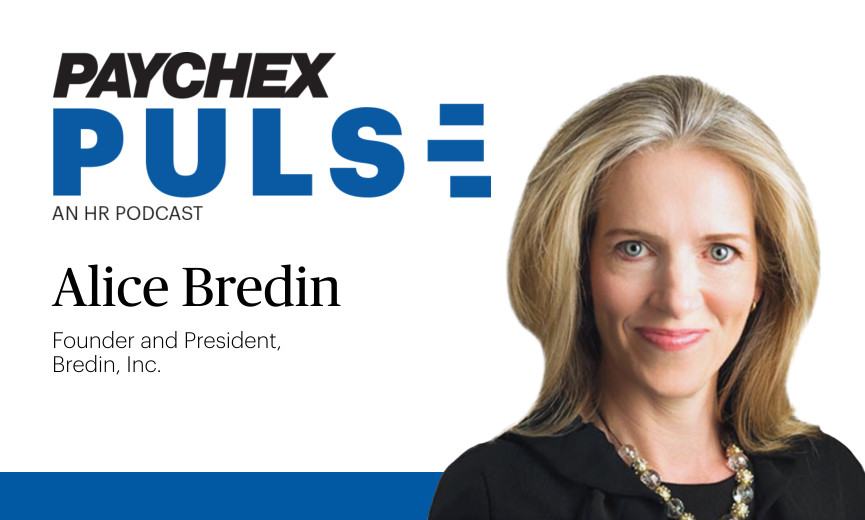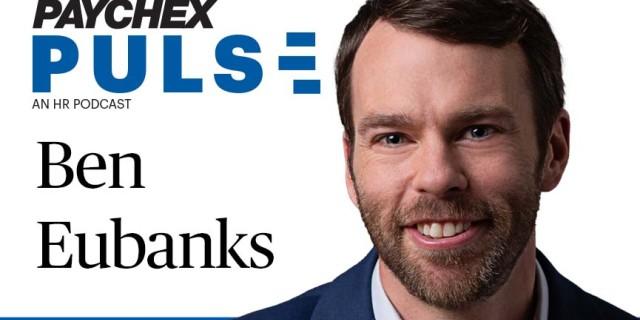The Rising Cost of HR, Battle for Talent, and More Insights from our 2024 Business Leader Priorities Study

Podcast •

Watch
Summary
From managing distributed teams to dealing with regulatory challenges, the role of HR has never been more critical — and we have the facts to prove it. On this episode of Paychex PULSE, Alice Bredin, founder and president of Bredin, Inc., shares insights from our 2024 Priorities for Business Leaders Report, including the increasingly integral role of HR administration, where businesses are investing around 600 hours annually. Alongside such a significant commitment in time and finances, companies are also grappling with complex issues such as talent acquisition and retention, risk management, and workers' compensation.
Topics include:
00:00 – Welcome Alice Bredin
01:24 – Discussion on 2024 Priorities for Business Leaders Report
02:07 – New challenges for the HR sector
03:16 – Importance of leadership development and managing performance
03:55 – Trends in managing performance and skills
05:13 – Varying HR challenges between different industries
07:12 – Insights on HR administration overload and its costs
11:01 – People management priorities
13:22 – Why leaders love to lead
14:29 – The importance of managing risk
15:23 – Wrap Up
Connect with Alice:
> LinkedIn
Don’t forget to download your copy of the 2024 Priorities for Business Leaders Report.
Join our upcoming webinar to take a deeper dive into the challenges, strategies, and innovative ideas found in our 2024 Priorities for Business Leaders Report.
See how you compare with the leaders we surveyed by completing our two-minute interactive assessment.
Need help with the countless HR tasks on your to-do list? Paychex can help.
View Transcript
Alice Bredin (00:00)
So, what we found is two-thirds of companies are spending close to 600 hours a year on HR admin. So, two-thirds of companies spending 600 hours a year on HR admin. And then the spending for the biggest businesses, you know, to try to correlate, to, like, what does that actually cost? 400,000.
Rob Parsons (00:23)
Welcome to season four of Paychex PULSE, an HR Podcast, where HR professionals can find great insights on today's top issues and be inspired to build and lead effective teams in a healthier workplace. Hi, everyone. I'm Rob Parsons. Welcome to the Paychex PULSE podcast. Joining me today is Alice Bredin. Alice is the founder and president of Bredin, Inc. An independent market research firm that works with Paychex to conduct industry-leading thought leadership studies. Bredin provides market research to leading brands around the world. And Alice herself has more than 25 years of experience gathering and analyzing business research. Alice, welcome to the podcast.
Alice Bredin (01:09)
Happy to be here.
Rob Parsons (01:11)
So, it's so great to have you. And I want to talk about the latest study that you've conducted for us, the Priorities for Business Leaders for 2024. So, you've done this annual survey a few years now, haven't you?
Alice Bredin (01:24)
Yes, it's the sixth year, and I mean, it really just is so interesting. So, every year we talk to business leaders across the country in companies with 500 or fewer employees in all kinds of industries, and we ask them what's on their minds, what are their priorities. And I think most interestingly to me is how they're solving problems.
Rob Parsons (01:45)
And we've definitely seen different priorities, different challenges over these past few years, everything from working from home to returning to the office, inflationary pressures, hiring pressures. But I want to focus on this being the PULSE Podcast and focused on HR. I want to talk about HR challenges. What did you see there? Did anything unusual pop up this year in 2024?
Alice Bredin (02:12)
Yeah, there's just some amazing stuff. But just to set the context, nine out of 10 companies are planning to increase headcount in 2024. That's not a shocker. But then what I thought was interesting is that when we asked HR leaders how much of a challenge it was going to be to hire, they said the struggle level is up this year compared to last. So that's interesting to me. So now we've got quite a bit more than half saying that they're really concerned about that. All right, so that's sort of what they're doing and what they're worried about. But then specifically within the HR world of things they need to get done, risk management is the top, and managing workers' compensation. So that's the absolute top challenge that HR leaders say they're facing. So, I mean, I think that's interesting. There are lots of reasons for that. Employees all over the place, the need to retain. I mean, all of the reasons that we know that companies are really focused on creating a compelling and great work environment. So that makes a lot of sense to me, but I still think it's interesting. Then very next on the list is leadership development. So that's new. That's interesting to me. And not far behind it is managing performance. Now, I also think that's a sign of the times because employees are here, there, and everywhere. Retention is key. And if you want to succeed in this context and in all those domains, you've got to give your leaders the training and the backup they need to do their jobs as well as possible and make sure that you're managing performance and making employees feel like you're a place that they want to stay. So that, to me, really jumped out.
Rob Parsons (03:55)
And it's completely consistent with what you all found over the summer when we did the Pulse of HR of 2023. This idea of managing, and I think it speaks to the fact that managing is different now. It's changed, and you've got to be equipped with different skills. There's different things happening out there in the world, aren't there?
Alice Bredin (04:17)
I mean, it's different. And I think that you're making a great point, which is that there's a recognition that this does not happen automatically, and there's training and upskilling required to really make your leaders and their teams feel supported. Just feel supported and feel like they have a future with you and enable them to do their best job and to be productive. So, I think it's a really great trend that we're seeing, because I really do think that it's not only great for people on the job, but it's just a really great recognition on the part of companies that support needs to be there.
Rob Parsons (05:00)
I love it, and I love your statement. It doesn't happen by accident. And we've talked about this with culture, with a lot of things. This idea of intention makes a huge difference. When you looked at HR challenges, did you see any difference between different industries? We tend to just say employers, and we are very broad. But you and I know different industries have very different employer challenges.
Alice Bredin (05:28)
Oh, yeah. And I mean, that's just a great question to ask because I do think it's interesting to look at the total, but then you have to say, okay, well, these businesses are so vastly different. So, what are they facing? And we really looked at three industry groups, professional services, skilled trades, and retail. So, I mean, those are about as different as they come. So, what did we find? Professional services and skilled trades like the total group have risk management and managing workers' comp as their top. So that makes sense to me and that makes a lot of sense. But when we looked at retail, the tippy top concern for them is offering competitive compensation and benefits. Second for them is total rewards, which is really looking at, for anyone who's listening doesn't know, which is probably nobody. But just in case, that's really looking at the entire compensation package. Everything that's offered, from flexibility to comp and benefits and everything all rolled in and really communicating that in an ongoing way so that it's really clear. Anyway, so that makes sense to me in retail because it's such a brutal environment, retention and hiring is super tough. So total makes sense there. Second, in professional services and skilled trades, then we saw looking at competitive compensation and benefits and benefits administration. So, it's a little bit of the same for the total. But I think some interesting differences which map completely to the challenges that we know are present in these industries. Right. But I love it. I love digging into this stuff. Stop me, stop me before I go further.
Rob Parsons (07:08)
And that's a great segue into the next section I want to talk about. It's actually a section of the report called HR Administration Overload. And I think it's a great section, but I guess the news isn't all that great. And you touched on it there. All the different things HR leaders have to think about now and lean into now. What did you find about the actual costs associated with HR administration?
Alice Bredin (07:36)
Well, I would ask you if you're sitting down, but I know you are. So, I can actually share these numbers because they're like just crazy. So, what we found is two-thirds of companies are spending close to 600 hours a year on HR admin. So, two-thirds of companies spending 600 hours a year on HR admin. And then the spending for the biggest businesses to try to correlate to like what does that actually cost up 400,000 a year as high as that. So that's sick. And your question, if I let you ask it, I know Rob would be how is that up from last year? And again, glad you're sitting because it's 70 percent increase from last year.
Rob Parsons (08:18)
That's just a huge number. And it's not just costs that I'm spending, there's opportunity costs there as well. I could be doing that management development, that leadership development that I'm talking about. Instead, I'm bogged down in admin, aren't I?
Alice Bredin (08:34)
No, it's crazy. And I mean, that is where that bogged down because we did a follow-up question to the time and cost and asked them, where does this time and money go? And the short answer is basically retirement and benefits administration. So, everything from the 401(k), health, dental, vision, and then payroll. So those are the drivers, both of time and cost.
Rob Parsons (08:59)
And it makes sense. We just got through, and I'm sure everybody else did. Annual enrollment, year-end payroll, W2s, things are not getting simpler, are they?
Alice Bredin (09:11)
I mean, they really aren't. And we found some interesting. We asked a little bit about what happens to time and expense when companies have locations in different states and employees in different states. And I mean, logically, this isn't surprising, but I think it's worth touching on because the numbers really go through the roof, of course, when organizations are trying to manage multiple locations and employees all over the place and, yeah, just keeping up with the compliance and then the struggles of distributed workers, as wonderful as it is. Yeah.
Alice Bredin (09:52)
It just ratchets up the everything, basically. That's a technical everything. Yeah.
Rob Parsons (09:57)
Yes. Well, we know every state has their own unique spin on how we should be handling and managing employers or employees, so that's no surprise at all.
Alice Bredin (10:09)
And we ask open-end questions in the survey, and you just hear it from leaders. They say, constantly changing new regulations, whether it's like industry or as you're saying, state or federal. The federal is consistent, obviously, but it's from all angles. And I think I really heard that almost plaintiff cry in the verbatims, which is people telling us exactly how they're feeling, just about. It's like constantly moving. It's just trying to keep track of all. It's really tough.
Rob Parsons (10:49)
You also had a big section on people management priorities, and here we saw a lot of variation between companies of different sizes.
Alice Bredin (11:01)
No, we really did. And I mean, the variation, this is just like the industry variation, where you're just so glad you asked because it really is quite different. But there was one commonality that I wanted to touch on, just to kind of emphasize the point I made before, which is that across all four size groups, again, between the really little ones with five, all the way up to companies with 500 employees, in every single size bracket, improving career planning and skill building is among the top three. So that's interesting to me. So that's a commonality. And then when we look at what's different in the smallest companies. That is the tippy-top focus. And then as companies get bigger, we see a focus on benefits and evolving those. Not just like offering them and handling the admin that we were talking about a moment ago, but actually improving them to make themselves more compelling to compete and then making sure those are good, not just for hiring, but also for retention. So, we see a lot of focus on benefits as companies increase in size, which, of course, is logical, but it's really stunning how among the biggest companies, I mean, they're really just focused on that.
Rob Parsons (12:20)
And I can see that just with our own client base, we're seeing there's a larger breadth of benefits being offered because different parts of the workforce want different things, and you can't just do a one-size-all-fits approach and expect it to work. Now. The environment just doesn't work like that.
Alice Bredin (12:39)
Well, we saw these leaders are very sophisticated, so obviously they know this. But I think starting last year, we really saw a greater focus and emphasis on a recognition of exactly what you just said, Rob, which is the one size fits all isn't going to work. And no matter how challenging it might be to do that and offer the right benefits to whoever they're trying to attract, they're really doing it because they know they've got to. And we've seen a real shift in the last couple of years on that front.
Rob Parsons (13:16)
So, I wanted to end with a bit on why leaders love to lead. I found that part of the report to be extremely interesting.
Alice Bredin (13:26)
Well, it's really cool because people share all these challenges with us, and you just hear about the hours, and you really just are thinking about how hard this job really is to do well, and you just admire them so much for what they're doing. But then it is really kind of, I guess the word to me is almost heartwarming to hear what keeps these leaders going, because the top one was the satisfaction of developing teams to their potential, which just really shows you that the focus really is on the employees and not just on the numbers or the admin. So, I think that's just really nice. And the second is using creativity to find solutions to problems. And we really see that when leaders share with us how they're going to face down these challenges, you do see just amazing creative thinking and real smarts and fresh ideas. So, it's nice to see.
Rob Parsons (14:24)
It's an exciting time, I think. Any parting thoughts for our listeners?
Alice Bredin (14:29)
Well, I mean, some other number, I know you were asking me early on what really jumped out to me, but we did ask about overall, how are you going to manage risk and be efficient with it, right? Because there's managing it. But we talked about the numbers a few minutes ago, and they're just crazy. So what we found this year is that 78% say that it's extremely or very likely that they'll outsource HR admin tasks in the next twelve months. And that's up. And again, you're seated, which is good. That's up from 17% the year before. And I mean, to me, what I hear in that is all the stuff we talked about, multistate employees with all different kinds of needs, making sure you're meeting those. It's just a lot. And I think there's a recognition like you just can't go it alone.
Rob Parsons (15:18)
That's fantastic, Alice, so much great information in our little podcast. We certainly didn't get time to touch on it all but thank you so much for joining and sharing some of the highlights with us.
Alice Bredin (15:29)
Oh, my pleasure. Thanks for having me.
Rob Parsons (15:32)
And thank you to our listeners. To get your own copy of the research, you can go to pages.paychex.com/2024-priorities-report and we'll also put a link in our show notes for you. And don't miss our upcoming webinar series on this data. We'll be doing one a month, and Alice is actually joining us for the first event on January 25. You could just visit payx.me/HRgrowth to sign up. That's Payx.me/HRgrowth. We'll also get that registration link into the show notes for you as well. That brings this episode to a close. As always, please stay happy and healthy. Be sure to subscribe to this and our Paychex THRIVE Business Podcast on your favorite podcast platform. Looking for more ways to keep your finger on the pulse of industry dynamics? Visit our resource center for the latest research, thought leadership, and news at paychex.com/worx. That's W-O-R-X. Thanks again for joining us. Until next time, please stay happy and healthy.
Announcer (16:44)
This podcast is property of Paychecks Incorporated, 2024. All rights reserved.

 Apple Podcast
Apple Podcast Spotify
Spotify iHeartRadio
iHeartRadio








